2023 Acquisition Highlights
December 2023
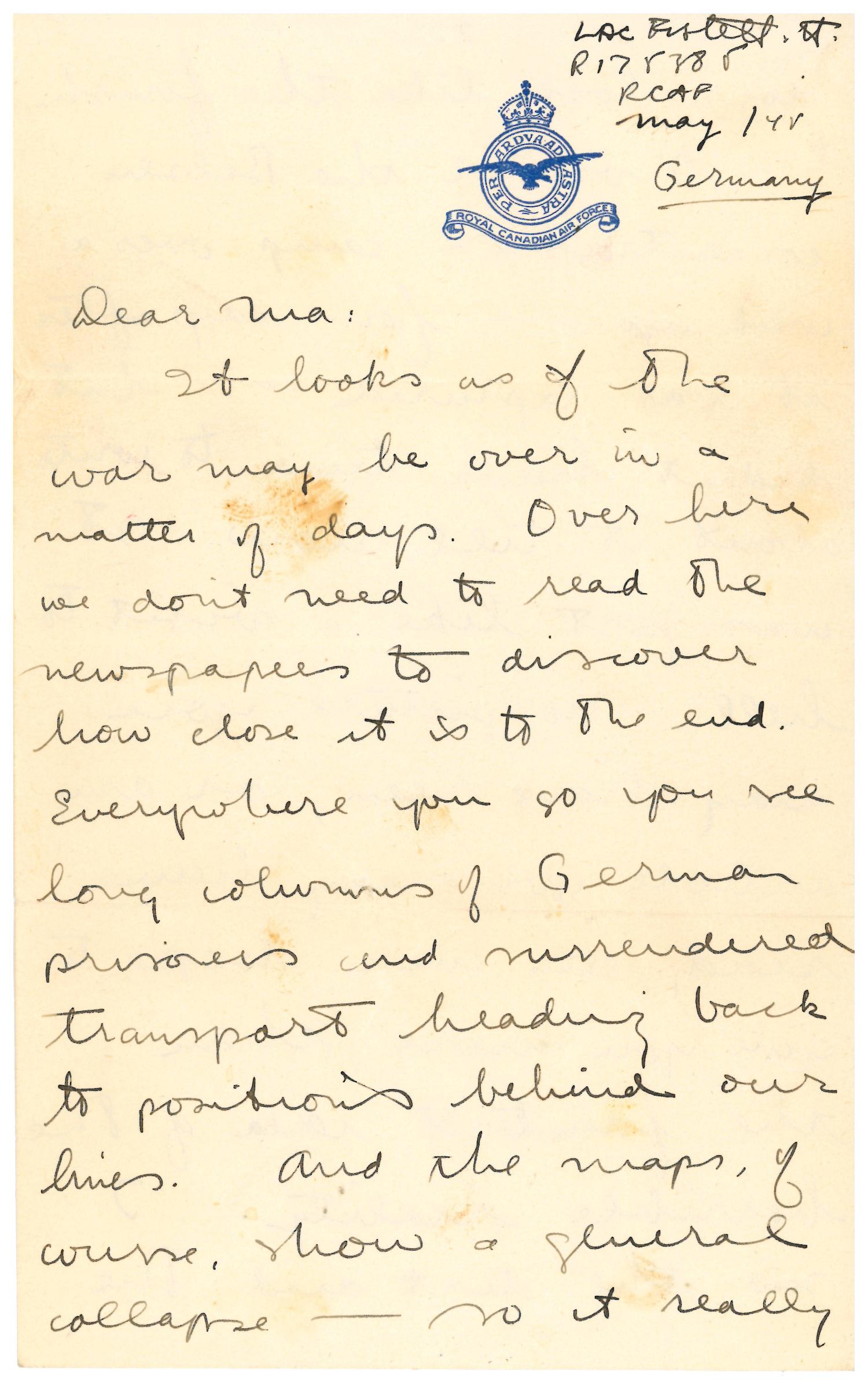 Harry Fistell served in the Royal Canadian Air Force (RCAF) in the Second World War. In May 1945, he wrote two letters to his mother back home in Canada. The letters address, among other subjects, the end of the war and Harry's travels in postwar Europe. Interesting as these subjects are, the correspondence is notable primarily for Harry's description of the Bergen-Belsen concentration camp, which he visited four days after its liberation by British troops in April of the same year.
Harry Fistell served in the Royal Canadian Air Force (RCAF) in the Second World War. In May 1945, he wrote two letters to his mother back home in Canada. The letters address, among other subjects, the end of the war and Harry's travels in postwar Europe. Interesting as these subjects are, the correspondence is notable primarily for Harry's description of the Bergen-Belsen concentration camp, which he visited four days after its liberation by British troops in April of the same year.
In the first letter to his mother, he describes his horror at what he saw:
It was just like a visit to hell. No picture you may have seen, or any article you may have read, can ever hope to give you more than the faintest ideas of the horrible reality. I saw the dirt and the piles of starved dead bodies of men, women and kids, and things I can't even write about. I saw about four or five hundred dead bodies and not one of them resembled anything human.
In the same letter, Harry goes on to describe what else he saw, including members of the SS "do[ing] the dirty work" of "filling up one of the great pits with corpses." The letter makes for difficult reading, but it is a powerful firsthand account of Nazi crimes.
The two letters were donated to the OJA by Harry's nephew Shelly Grimson and will eventually become part of the Shelly Grimson fonds. In donating the letters, Shelly explained that he was motivated by the desire to preserve evidence of the Holocaust as a way to counter Holocaust denial.
November 2023
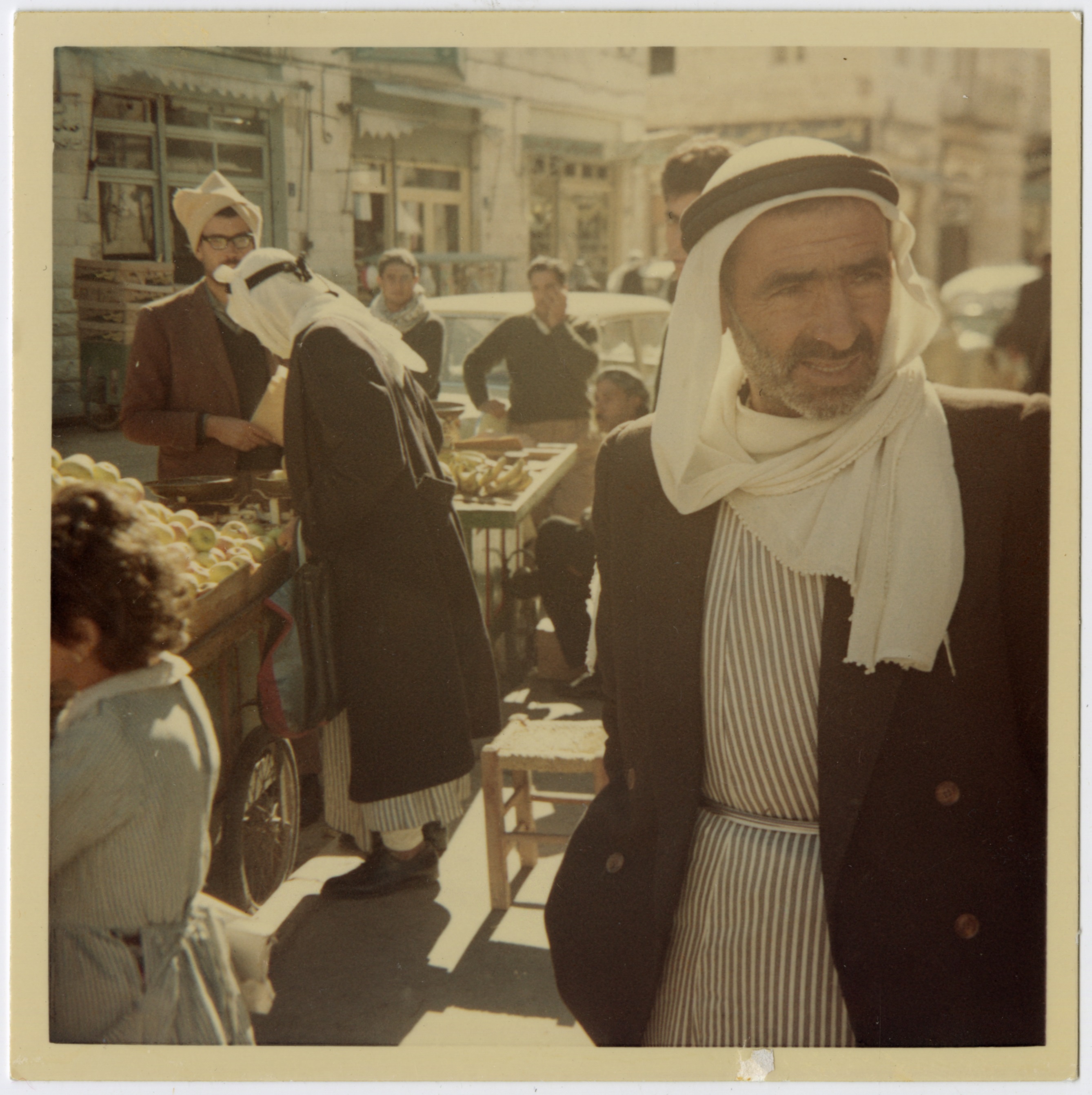 In December 1967—six months after the Six-Day War—members of Toronto's UJA Leadership Fact-Finding Commission travelled to Israel to participate in a twelve-day, fact-finding mission to study the country's health and welfare needs. Among those who participated in the mission was Sam Crystal. Some fifty-six years later, Sam's son Ken donated his father's photographs from that trip.
In December 1967—six months after the Six-Day War—members of Toronto's UJA Leadership Fact-Finding Commission travelled to Israel to participate in a twelve-day, fact-finding mission to study the country's health and welfare needs. Among those who participated in the mission was Sam Crystal. Some fifty-six years later, Sam's son Ken donated his father's photographs from that trip.
Many of the photographs document territory occupied by Israel in the war, including East Jerusalem, the Golan Heights, and the West Bank city of Nablus. There are also photographs of current and former Israeli leaders, such as Levi Eshkol, Zalman Shazar, and David Ben-Gurion. Former mayor of Toronto Phil Givens—a member of the commission—can also be seen in several of the photographs.
The mood of the photos is largely one of jubilation, although there are also photographs showing the destruction caused by war. In total, the series comes out to 149 photographs, forty of which are in colour and 109 of which are in black and white.
September 2023
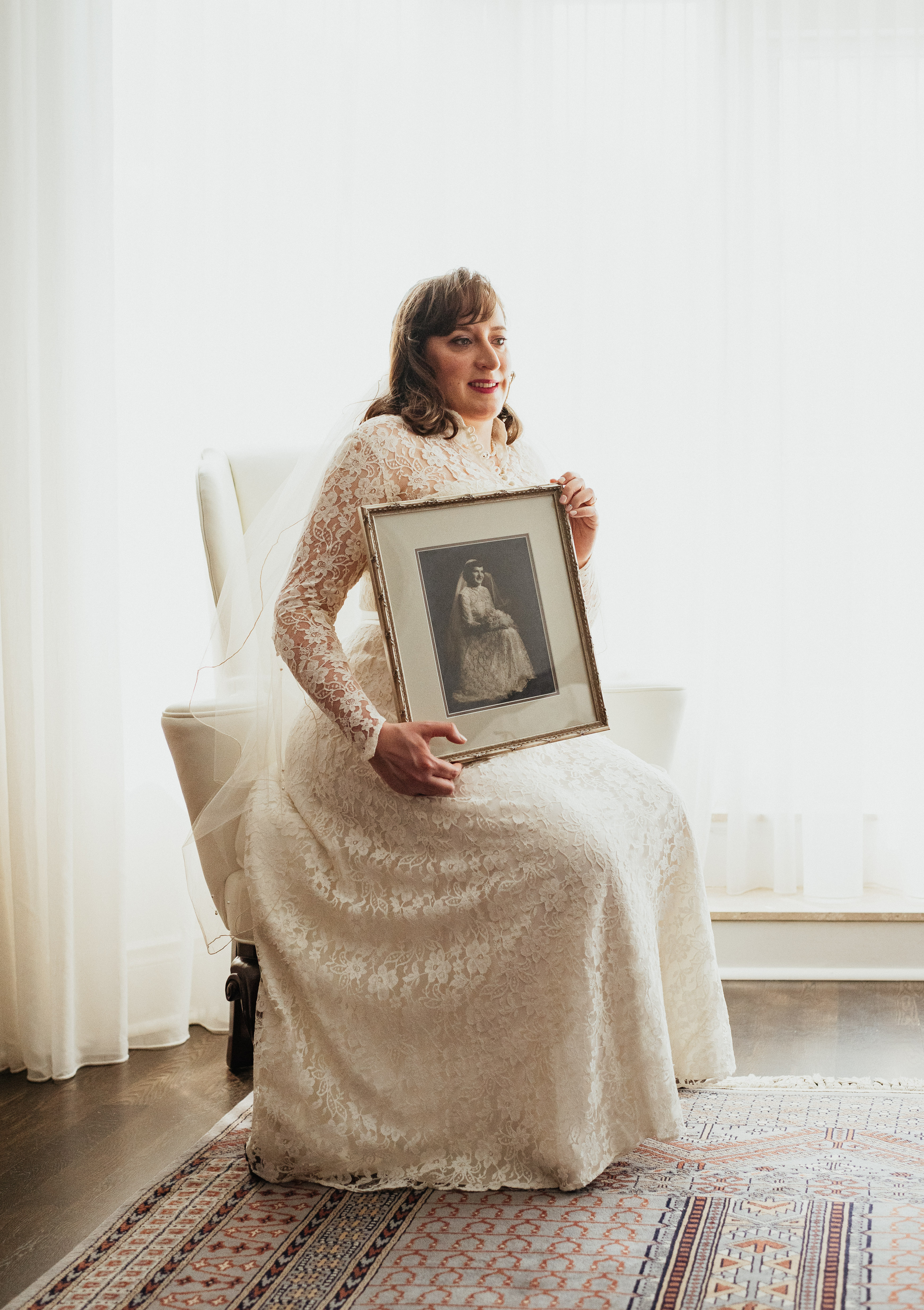 On 21 May 2023, Samantha "Sam" Mogelonsky married her longtime partner, Matthew "Mat" Calverley. What was notable about the wedding was Sam's choice of dress. Instead of purchasing a brand new dress, as is common, Sam wore the dress worn by her grandmother, Lila Brownberg, in 1950. A contemporary description described Lila's outfit this way: "The bride wore a Dior model instep length jacket dress of white Chantilly lace over slipper satin. The skirt having a full flare which extended from a smooth hipline. The fitted jacket buttoned to the neck with tiny self-covered buttons. The neckline was a mandarin style and the long sleeves finished at wrist with matching buttons."
On 21 May 2023, Samantha "Sam" Mogelonsky married her longtime partner, Matthew "Mat" Calverley. What was notable about the wedding was Sam's choice of dress. Instead of purchasing a brand new dress, as is common, Sam wore the dress worn by her grandmother, Lila Brownberg, in 1950. A contemporary description described Lila's outfit this way: "The bride wore a Dior model instep length jacket dress of white Chantilly lace over slipper satin. The skirt having a full flare which extended from a smooth hipline. The fitted jacket buttoned to the neck with tiny self-covered buttons. The neckline was a mandarin style and the long sleeves finished at wrist with matching buttons."
When she married in 1986, Sam's aunt, Marcia Mogelonsky, chose to wear Lila's dress. Sam continued the family tradition in 2023. First, though, she had to have the dress cleaned. The dress thus underwent a textile conservation process. After that, it was sent to the bride-to-be's tailor, Vintage Bride, who "magically altered" the dress. And while the dress was kept essentially the same, Sam made a few alterations of her own, noting "I added the little belt for some bling, and I chose to wear the collar open, as it was May and warm." In the photo to the left—taken by Wade Muir—Sam is seen wearing the dress while holding a framed portrait of her grandmother in the same dress.
In addition to this one photo, Sam donated twenty other photos from the wedding. The OJA is pleased to receive these and help document a special family tradition that's now been brought to life by three generations of women.
July 2023
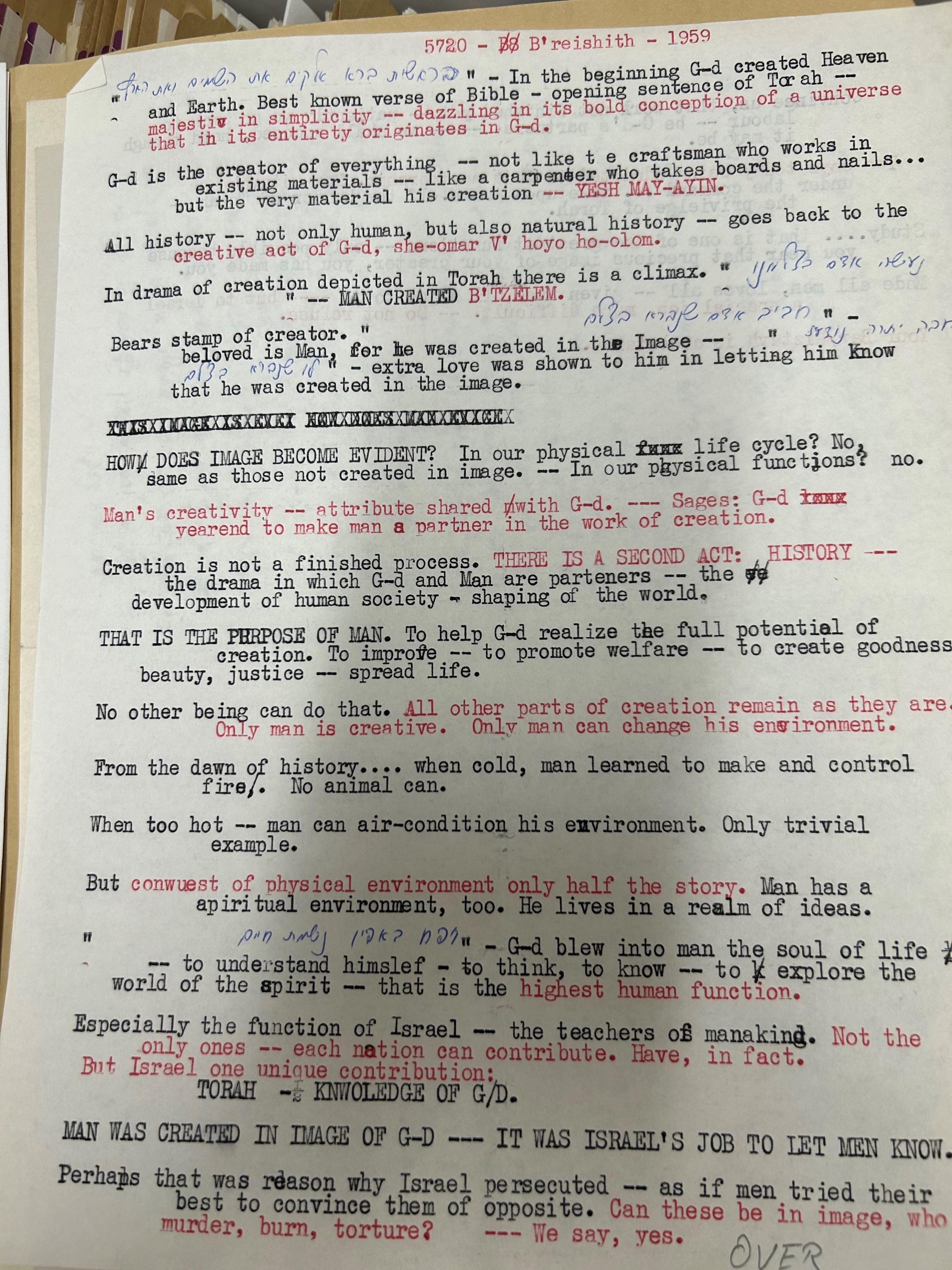 In the fall of 2022, archivist Faye Blum began working with Rabbi Erwin Schild to acquire the rabbi's records for donation to the Ontario Jewish Archives. In Rabbi Schild's most recent donation—which comes out to sixty-three centimetres of textual records—are his sermons. The latter are organized by parashah (weekly Torah portion) and Jewish holidays. Shown here are notes prepared by Rabbi Schild on Bereshit (Genesis) in the year 5720 of the Hebrew calendar (1959 in the Gregorian calendar).
In the fall of 2022, archivist Faye Blum began working with Rabbi Erwin Schild to acquire the rabbi's records for donation to the Ontario Jewish Archives. In Rabbi Schild's most recent donation—which comes out to sixty-three centimetres of textual records—are his sermons. The latter are organized by parashah (weekly Torah portion) and Jewish holidays. Shown here are notes prepared by Rabbi Schild on Bereshit (Genesis) in the year 5720 of the Hebrew calendar (1959 in the Gregorian calendar).
The first folder of Rabbi Schild's sermons, consisting of thirty-some documents, has been digitized and can be viewed here. In the future, the OJA hopes to digitize more sermons such that researchers unable to visit the OJA in person are able to read them online.
June 2023
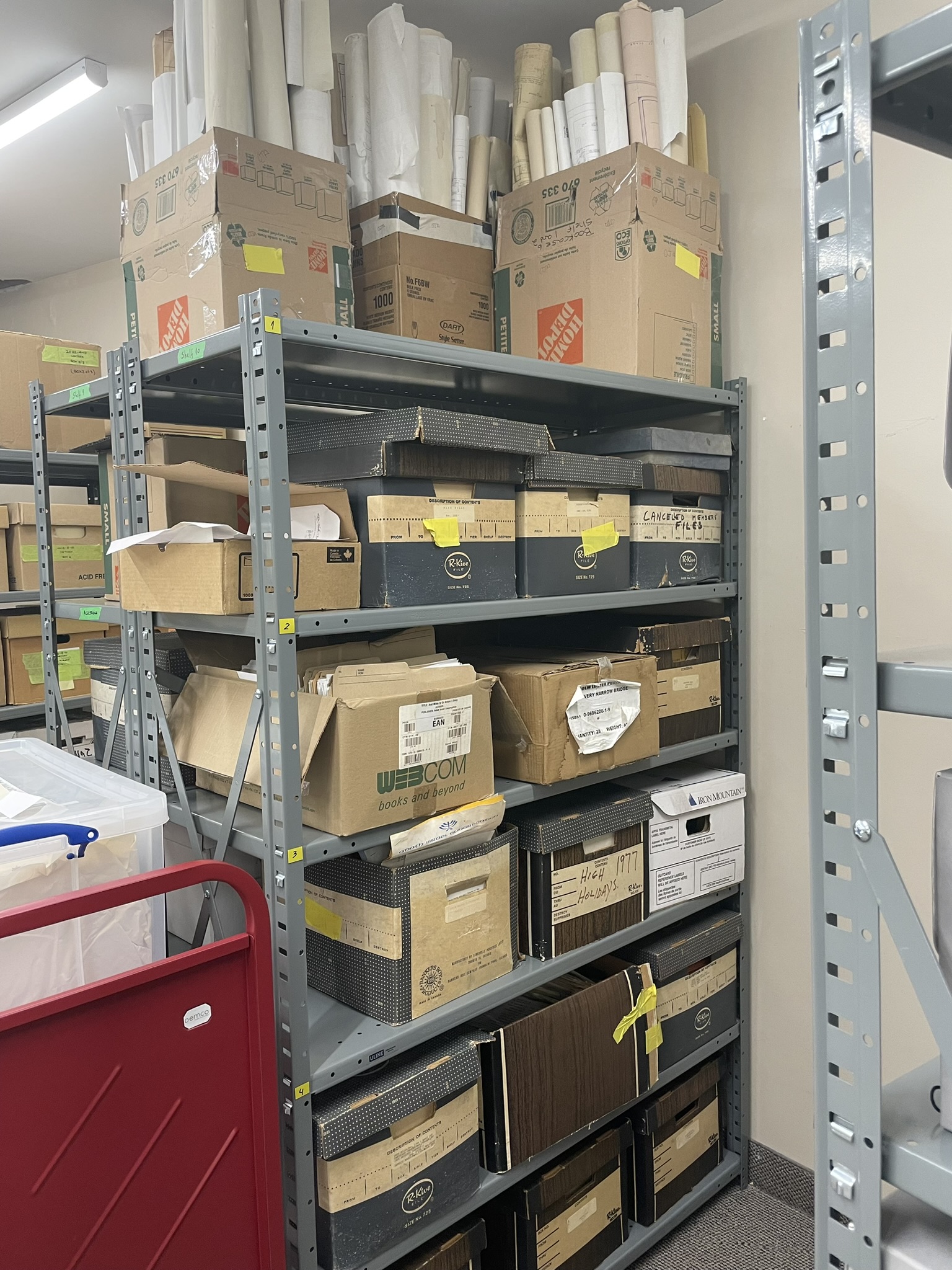 Since the 1850s—the decades when Ontario's first synagogues came into existence—synagogues have occupied a central place in Jewish life in the province. In June, the OJA was honoured to acquire records from Adath Israel Congregation. Adath Israel traces its origins to the year 1911, when a group of Romanian Jews banded together to form the First Roumanian Hebrew Congregation Adath Israel (the name was shortened in the 1950s). Since those early days, the congregation has gone through a number of moves, but its members continue to honour their roots. The donation of the records was made possible by Michael Cohen, the congregation's executive director, and Rabbi Cutler, the congregation's senior rabbi. The donation itself (pictured left) took up an entire storage shelf, which means the OJA's archivists will have their hands full processing the records in the coming months and years!
Since the 1850s—the decades when Ontario's first synagogues came into existence—synagogues have occupied a central place in Jewish life in the province. In June, the OJA was honoured to acquire records from Adath Israel Congregation. Adath Israel traces its origins to the year 1911, when a group of Romanian Jews banded together to form the First Roumanian Hebrew Congregation Adath Israel (the name was shortened in the 1950s). Since those early days, the congregation has gone through a number of moves, but its members continue to honour their roots. The donation of the records was made possible by Michael Cohen, the congregation's executive director, and Rabbi Cutler, the congregation's senior rabbi. The donation itself (pictured left) took up an entire storage shelf, which means the OJA's archivists will have their hands full processing the records in the coming months and years!
May 2023
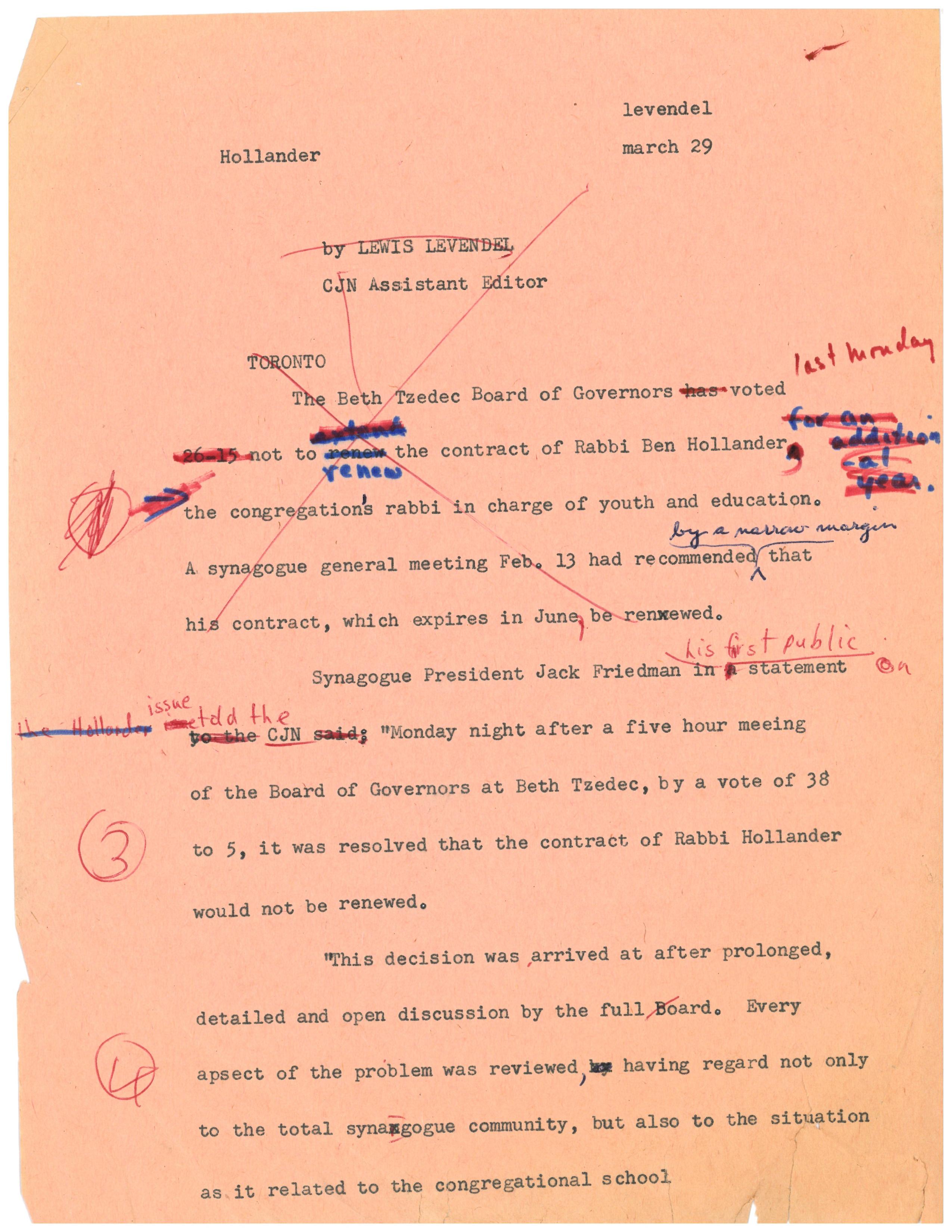 Sometimes the best acquisitions come in at the end of the month. May was one of those months. On 30 May, Lewis Levendel donated material documenting a major controversy that transpired at Beth Tzedec in the 1970s. The story provoked national and even international news coverage, as one of the figures involved, Rabbi Stuart E. Rosenberg (1922–1990), was a well-known figure in both Canada and the United States. According to Encyclopedia.com, the controversy involved a "bitter power struggle between [Rabbi Rosenberg] and the officers of Beth Tzedec Synagogue in Toronto, which claimed then to be the largest congregation in the world."
Sometimes the best acquisitions come in at the end of the month. May was one of those months. On 30 May, Lewis Levendel donated material documenting a major controversy that transpired at Beth Tzedec in the 1970s. The story provoked national and even international news coverage, as one of the figures involved, Rabbi Stuart E. Rosenberg (1922–1990), was a well-known figure in both Canada and the United States. According to Encyclopedia.com, the controversy involved a "bitter power struggle between [Rabbi Rosenberg] and the officers of Beth Tzedec Synagogue in Toronto, which claimed then to be the largest congregation in the world."
At the time, there was some disagreement as to whether Canadian-Jewish periodicals, such as the Canadian Jewish News, ought to cover the scandal, with some feeling that to do so was to air the community's dirty laundry. Others, in contrast, felt that the reputation of Canadian-Jewish periodicals would be irreparably harmed were they not to cover it, since non-Jewish publications were. One of those journalists who did cover the scandal was Lewis Levendel, who subsequently wrote about the episode in his book, A Century of The Canadian Jewish Press: 1880s-1980s.
Thanks to Levendel's donation, researchers will be better positioned to make sense of this fascinating episode in Canadian-Jewish history.
April 2023
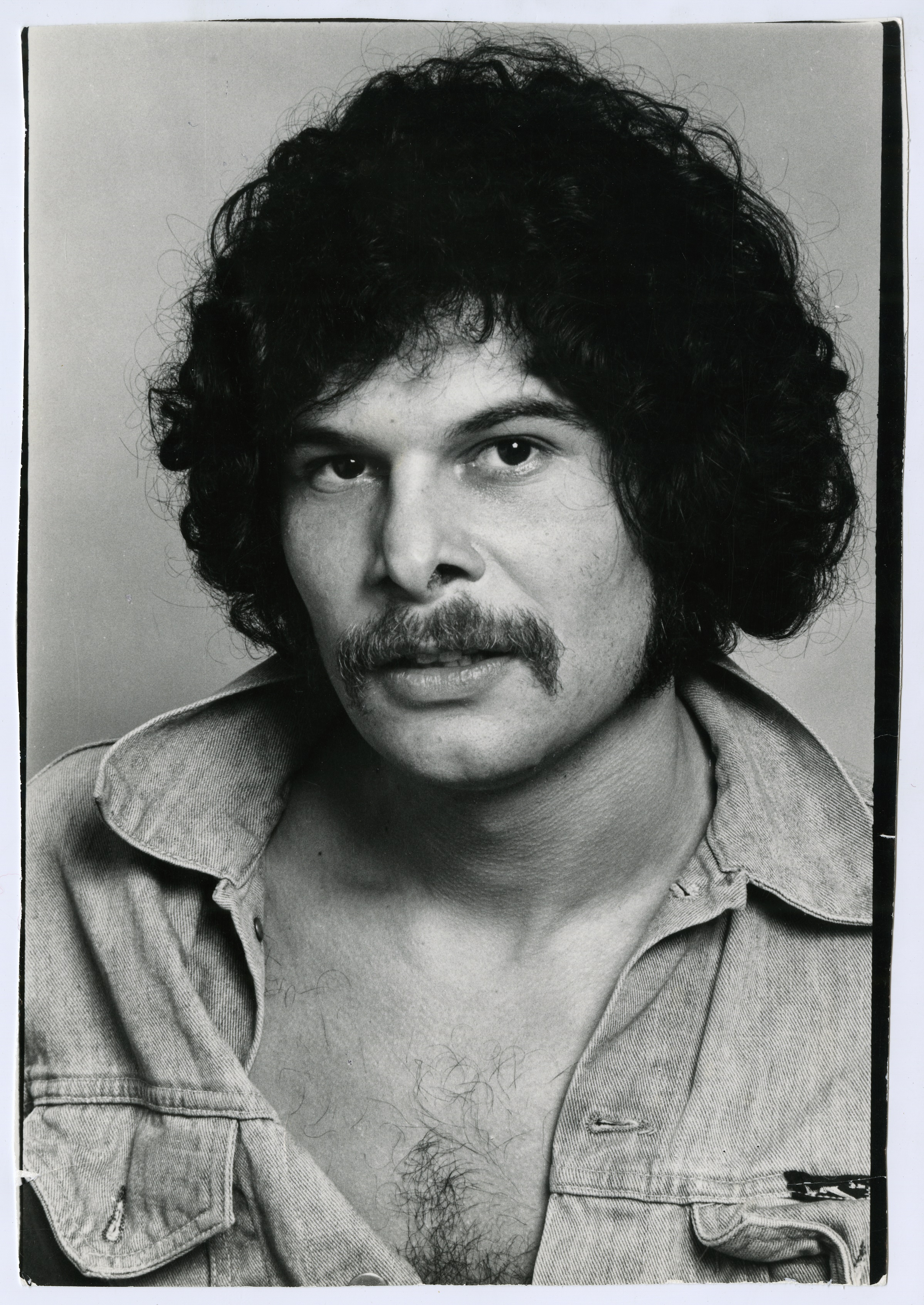 Gerry Salsberg was a Canadian actor known for his roles in The Last Detail (1973), Breaking Point (1976) and Never Forget (2008). Born in Toronto, Ontario, on 15 March 1949, Gerry started performing on stage as a student, being active in stage productions in both high school and university. His accomplishments include a Best Actors Award from the St. Jean Film Festival, which he received for his performance as Wolf in the film Wolf Lanigan.
Gerry Salsberg was a Canadian actor known for his roles in The Last Detail (1973), Breaking Point (1976) and Never Forget (2008). Born in Toronto, Ontario, on 15 March 1949, Gerry started performing on stage as a student, being active in stage productions in both high school and university. His accomplishments include a Best Actors Award from the St. Jean Film Festival, which he received for his performance as Wolf in the film Wolf Lanigan.
In February, Gerry's sister, Karen, donated a small amount of material documenting her brother, including some newspaper clippings, a program for a celebration of Gerry's life, and the text of a speech given by her. In April, Karen donated one additional folder of material, including this gorgeous headshot of Gerry, which was probably taken around 1972, the year Gerry appeared in a performance of Godspell.
In addition, to his work on stage and in front of the camera, Gerry was an avid photographer. He died on 22 June 2010.
March 2023
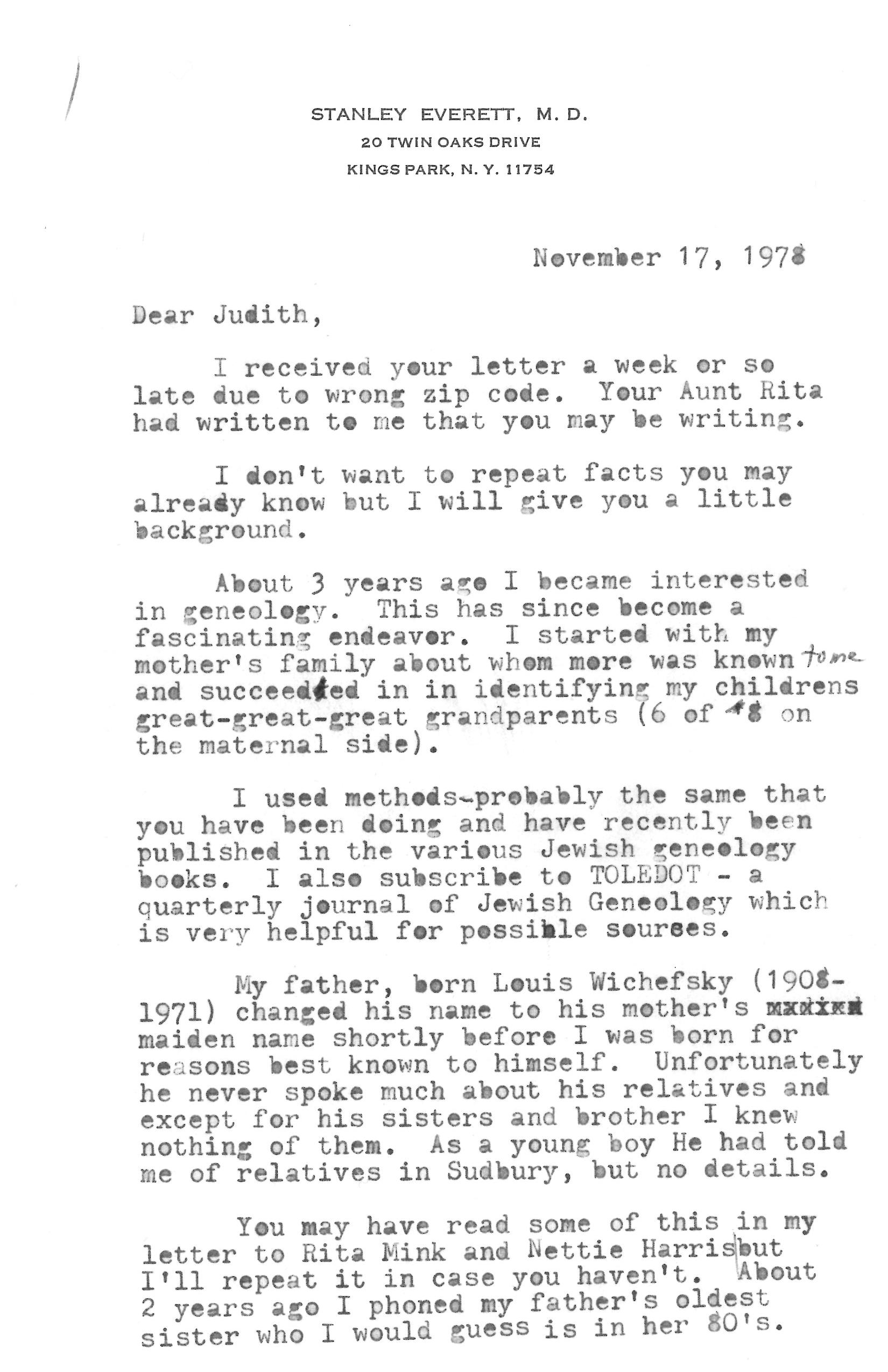 In March, Judith "Jay" Nefsky, the first professional archivist of the Canadian Jewish Congress National Archives, donated records documenting her research into her extended family. As one might expect for an archivist, the records were logically arranged, which made the task of accessioning them rather straightforward. Shown here is a letter—logically filed in a folder titled Correspondence—to Judith from Stanley Everett. In the letter, Stanley discusses his interest in genealogy, his research into his mother's family, and the methods he has been using to conduct his research. Apart from providing information about the author's background, the letter affords us a window into the motivations that lie behind genealogical research. No doubt many of the researchers who come to the OJA for the purpose of conducting genealogical research can relate to at least a few of Stanley's remarks.
In March, Judith "Jay" Nefsky, the first professional archivist of the Canadian Jewish Congress National Archives, donated records documenting her research into her extended family. As one might expect for an archivist, the records were logically arranged, which made the task of accessioning them rather straightforward. Shown here is a letter—logically filed in a folder titled Correspondence—to Judith from Stanley Everett. In the letter, Stanley discusses his interest in genealogy, his research into his mother's family, and the methods he has been using to conduct his research. Apart from providing information about the author's background, the letter affords us a window into the motivations that lie behind genealogical research. No doubt many of the researchers who come to the OJA for the purpose of conducting genealogical research can relate to at least a few of Stanley's remarks.
Apart from correspondence, Judith's donation also consists of a small number of photographs plus some documents and publications pertaining to Sudbury, Ontario.
February 2023
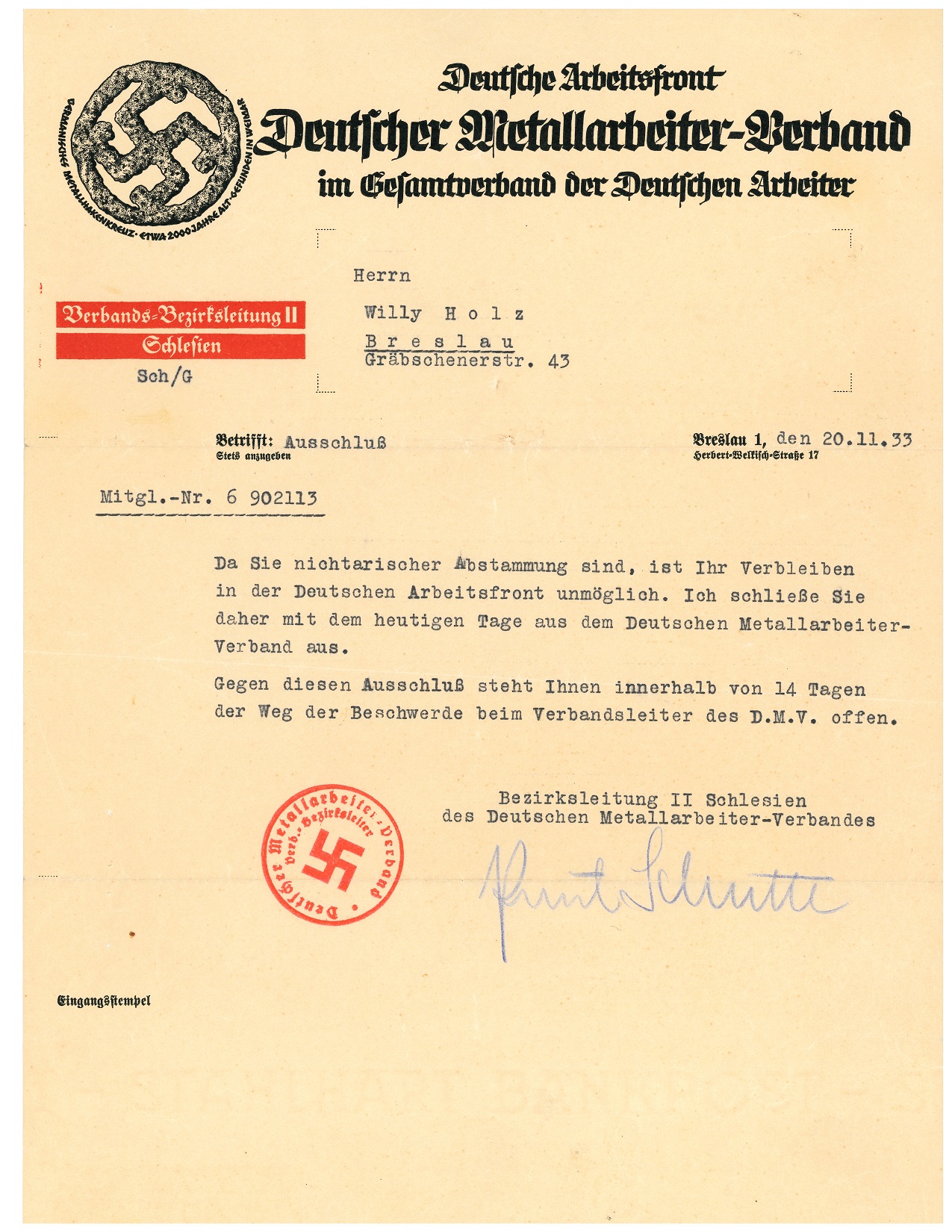 In February, Camile Norton donated the records of her step-father, Willi Holz, to the OJA, and boy do those records tell a fascinating story!
In February, Camile Norton donated the records of her step-father, Willi Holz, to the OJA, and boy do those records tell a fascinating story!
Willi was born in Breslau, Germany, in 1912. He attended elementary school and technical high school in the city and worked as an electrician at several firms. In 1933, Hitler's National Socialist German Workers’ Party came to power and the trajectory of Willi's life, along with millions of other Jews, was sent on a a completely different trajectory. Shown left is a letter the German Metal Workers' Union sent to Willi (here spelled Willy) expelling him from the union because he is of nichtarischer ("non-Aryan") descent. The letter is dated 20 November 1933.
The above letter is only one of fifty-some records in this small but rich collection. Also included are Willi's diary, his German passport, a postcard from Palestine, the chronicle of Camp "L" (where Willi was interned), and personal correspondence. Taken together, these records tell the story of Willi's experience before, during, and after the Second World War, including his failed attempts to leave Germany for Palestine, Bolivia, and China; his tranfer to a camp for Jewish emigrants in Richborough, England; his eventual transfer to Quebec, where he was interned at Camp "L"; his transfer to Camp "N" in Sherbrooke, Quebec; his eventual release; his move to Toronto; and his path to Canadian citizenship, which he received on 4 May 1946. Willi's remarkable story came to an end on 10 October 1979. His funeral took place at Benjamin's Park Memorial Chapel.
January 2023
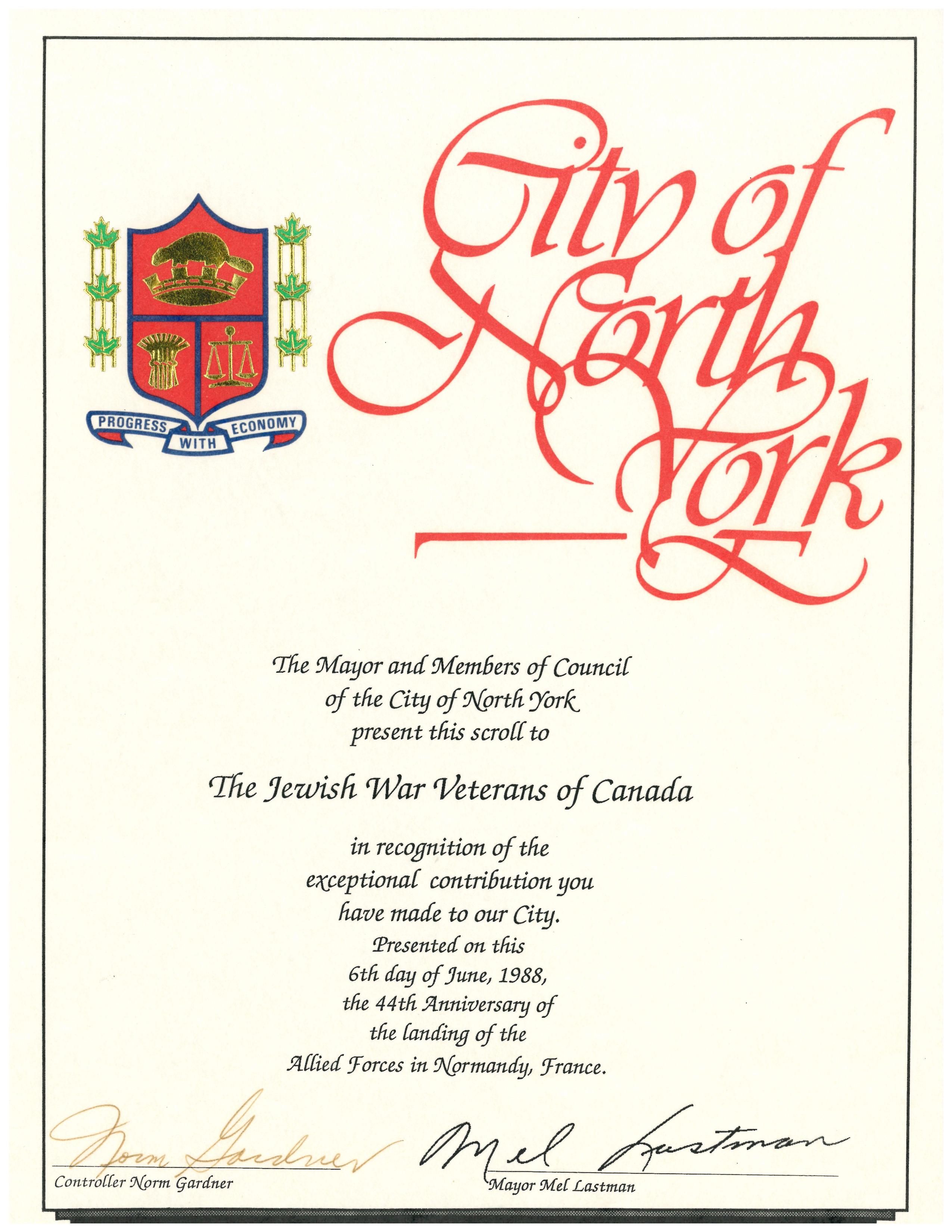 In January, the OJA was pleased to acquire material documenting the Jewish War Veterans of Canada. The accession consists of twelve centimetres of textual records and approximately ninety photographs. The materials were stored in the fourth-floor boardroom of the former office of the Jewish War Veterans of Canada before being transferred to the OJA. Shown here is a document from the City of North York and signed by controller Norm Gardner and mayor Mel Lastman "in recognition of the exceptional contribution you [i.e., the veterans] have made to Our City." It was presented to the veterans on 6 June 1988, the fourtieth anniversary of the landing of the Allied forces in Normandy, France. Fun fact: Mayor Lastman became Toronto's third Jewish mayor after the amalgamation of Metro Toronto and its six constituent municipalties in 1988.
In January, the OJA was pleased to acquire material documenting the Jewish War Veterans of Canada. The accession consists of twelve centimetres of textual records and approximately ninety photographs. The materials were stored in the fourth-floor boardroom of the former office of the Jewish War Veterans of Canada before being transferred to the OJA. Shown here is a document from the City of North York and signed by controller Norm Gardner and mayor Mel Lastman "in recognition of the exceptional contribution you [i.e., the veterans] have made to Our City." It was presented to the veterans on 6 June 1988, the fourtieth anniversary of the landing of the Allied forces in Normandy, France. Fun fact: Mayor Lastman became Toronto's third Jewish mayor after the amalgamation of Metro Toronto and its six constituent municipalties in 1988.